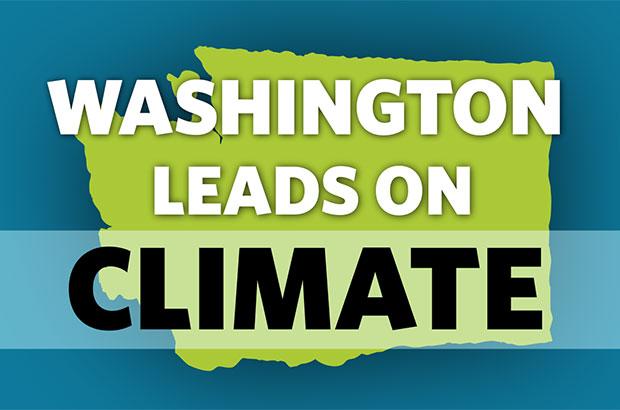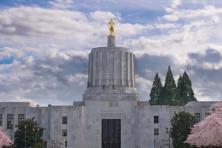In the waning hours of the 2021 legislative session and the day following Earth Day, the Washington House of Representatives passed the Climate Commitment Act in a floor vote of 54-43. With the state Senate already passing the policy earlier this month, that chamber will need to concur on the House version as a last step before the bill moves to Governor Inslee’s desk for his signature. Once signed into law, Washington will have a firm statewide cap on global warming pollution, covering 75% of the greenhouse gas emissions for the state.
There is broad and diverse support for the historic policy; key leaders lent their voices in celebration of the pending law:
"Today, I want to honor and thank my teachers and heroes, Quinault President Joe DeLaCruz and Nisqually visionary Billy Frank Jr., for laying the groundwork for us to reach this day -- the day the Washington State House of Representatives finally boldly confronted the existential threat of climate change," said Fawn Sharp, President of the National Congress of American Indians and Vice President of the Quinault Indian Nation. "Our collective spirit soars for the ancestors whose example we have finally heeded, and for our youth and children who deserve to live in this beautiful and blessed land the way the Creator intended it."
“Historically, American society has failed to make the connection in terms of the direct impact of environmental injustices, including climate change, on our own lives, families, and communities, all of whom depend on the physical environment and its bounty,” said Paula Sardinas, Chief Advocate for the Washington Build Back Black Alliance. “Today, with this bill, Washington state is taking meaningful steps to change that dangerous trajectory. We are going to leave our children a far better planet than the one we all inherited.”
“Washington leaders and grassroots movements have tried for nearly two decades to pass meaningful, comprehensive climate change policy to mitigate it's existential threat,” said Estela Ortega, Executive Director of El Centro de la Raza. “This year, we are seizing this opportunity to act on this life-or-death issue that disproportionately impacts, impoverishes, and kills communities of color. We are finally making real progress.”
“The climate crisis requires bold and decisive action for a livable future. Today, the House of Representatives delivered by passing the most comprehensive carbon pricing program in the nation,” said Rebecca Ponzio, Climate and Fossil Fuel Program Director, Washington Environmental Council/Washington Conservation Voters. “The Climate Commitment Act reflects historic leadership to address climate pollution and the harmful impacts to overburdened communities.”
“This landmark bill creates two programs: a cap and investment program and an air quality regulatory program poised to reduce health-harming pollution in communities overburdened with pollution for decades,” said David Mendoza, Advocacy and Engagement Director for The Nature Conservancy in Washington. “This dual-program component ensures we will reduce all types of emissions, invests in natural climate solutions, and helps create a future that’s more resilient and built on a foundation of environmental justice. None of this would have been possible without the engagement of Tribal nations and Black- and Latino-led stakeholder organizations from every corner of our state.”
“I’m a bit in disbelief, as this is years and years of work by many, many people to get here. Washington State has been working for a well over a decade for this day—a firm and declining cap on climate pollution, a generational investment in transit, Tribal nations, and overburdened communities, and a commitment to deal with a climate crisis that is engulfing us today,” said Vlad Gutman-Britten, Climate Solutions Washington State Director. “This is the product of thousands of advocates, activists and voters that have raised their voices. They demanded progress, and now we’re one step closer.”
The Climate Commitment Act is a necessary component of Washington State’s carbon reduction strategy, including funding investments in air quality improvements in overburdened communities, transit access and mobility equity, and electrification. A consistent majority of Washington voters support the Legislature cutting carbon pollution and to take strong climate action.





